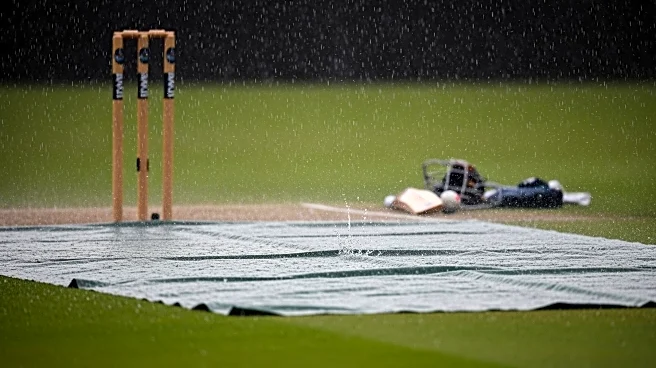What's Happening?
Pakistan's match against England in the Women's Cricket World Cup was called off due to rain, preventing Pakistan from securing a potential victory. The match, held at R. Premadasa Stadium in Colombo, saw Pakistan captain Fatima Sana win the toss and opt
to bowl first. England managed to score 131-9 in a rain-shortened 31-over game. Pakistan began their innings promisingly, reaching 34 without loss in 6.4 overs before rain halted play. The match was reduced to 31 overs per side, with England capitalizing on the remaining overs to score 54 runs at nine runs per over. Despite the interruption, England moved to the top of the tournament standings, while Pakistan remained at the bottom.
Why It's Important?
The rain-affected match has significant implications for both teams in the Women's Cricket World Cup standings. England's ability to secure a point despite the no-result allows them to overtake Australia and claim the top spot in the tournament. For Pakistan, the no-result means they remain winless and at the bottom of the standings, missing a crucial opportunity to gain momentum and improve their position. The outcome highlights the unpredictable nature of outdoor sports and the impact of weather conditions on tournament dynamics.
What's Next?
Both teams will need to strategize for their upcoming matches, with England aiming to maintain their lead in the standings and Pakistan seeking their first victory. The tournament schedule will continue, and teams must be prepared for potential weather disruptions. Stakeholders, including team management and players, will likely focus on adapting to changing conditions and maximizing their performance in future matches.
Beyond the Headlines
The rain-induced no-result underscores the challenges faced by teams in outdoor sports, where weather can significantly alter the course of a tournament. It raises questions about the adequacy of contingency plans and the fairness of outcomes in such situations. The event may prompt discussions on improving infrastructure and scheduling to mitigate weather-related disruptions in future tournaments.

















